Israel Accuses Iran Of Establishing Airport In Southern Lebanon
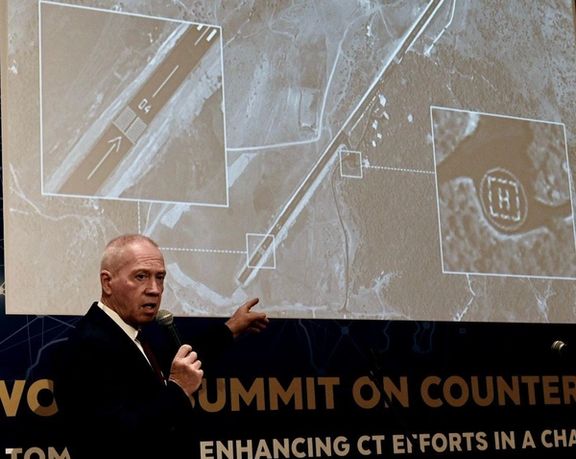
Israeli Defense Minister Yoav Gallant has leveled accusations against Iran, alleging the establishment of an airport facility in southern Lebanon.

Israeli Defense Minister Yoav Gallant has leveled accusations against Iran, alleging the establishment of an airport facility in southern Lebanon.
Gallant asserted Monday that Iran's intention behind establishing the airport is to facilitate potential attacks against Israel.
Addressing an international security conference hosted by Reichman University, Gallant presented evidence in the form of aerial images of the alleged site. According to the defense minister, the site is strategically situated approximately 20 kilometers (12.4 miles) from the Israeli border town of Metulla and possesses the capacity to accommodate mid-sized aircraft.
The backdrop to this accusation is the current control of southern Lebanon by Hezbollah, an armed militant group backed by Iran, with which Israel engaged in a war in 2006. Recent months have witnessed a resurgence of tensions in the region, raising concerns about regional stability and renewed large-scale armed conflict.
For Iran's clerical regime, Lebanon serves as a foothold dominated by Hezbollah, affording them the means to threaten Israel. While many Shiites view Iran as a source of financial support, a significant portion of Lebanon's Christian and Sunni populations resent Hezbollah and Iran's growing influence.
The founder of the Islamic Republic of Iran, Ayatollah Ruhollah Khomeini and his successors, have consistently expressed enmity towards Israel and have repeatedly called for its destruction over the years. Iran's arming of Hezbollah with a substantial arsenal of rockets and missiles further compounds the security challenges, directly threatening Israeli cities due to Hezbollah's operational presence in Shiite-dominated southern Lebanon.
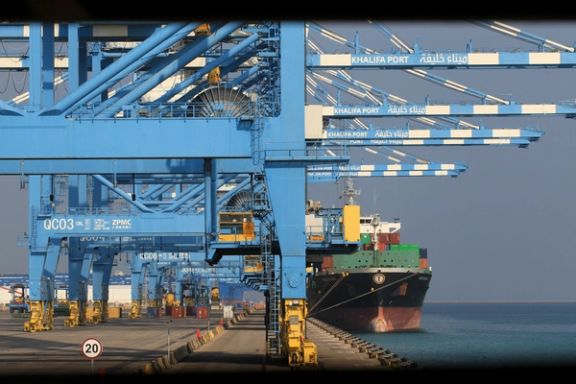
As diplomatic ties between the United Arab Emirates and Iran strengthen, economic and trade ties are also growing.
The two countries resumed diplomatic relations last year, the UAE sending its ambassador back to Tehran after six years of Cold War style ties.
The UAE downgraded its ties with Iran after Saudi Arabia severed its own relations with Tehran in January 2016. The move followed the storming of the Saudi embassy in Tehran by Iranian protesters after Riyadh executed a prominent Shiite cleric.
After years of animosity on different sides of geo-political rivalries, the UAE started re-engaging with Tehran in 2019 following attacks in Gulf waters and on Saudi energy sites amid heightened tensions after Washington quit global powers' nuclear pact with Iran.
In recent months, the UAE has rolled back limits on corporate registrations and the issuance of visas to companies from Iran, which remains subject to tough US sanctions. Iranian financiers are also exploring how to enhance bilateral trade by creating financial mechanisms to fund legitimate transactions, the Financial Times reported Sunday.
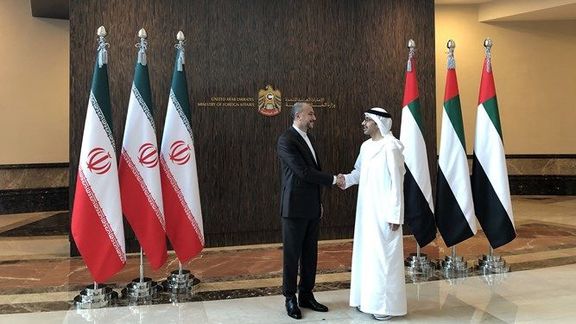
The UAE, a traditional center for re-exports into the Islamic Republic, offers a boon to the two countries’ ties, which continue to be blighted by geopolitical tensions including disputed islands which both claim to be their territory, and Iran’s ongoing nuclear ambitions. Around half a million Iranians live in the country, one of the biggest centres for the Iranian diaspora after the US.
UAE diplomatic outreach to Iran since 2019, in response to attacks on international shipping around the Gulf, has been strengthened by the China-brokered breakthrough this year that re-established relations between the Islamic republic and its traditional foe Saudi Arabia.
China remains the regime’s top trade partner but the UAE is its second, according to The Financial Times, which claims trade between Iran and the UAE has recovered from a pandemic slump of $11bn in 2020/2021 to $24bn in the 12 months ending in March, according to Iranian data.
The increase surpasses the $22bn recorded in 2012 before US-led sanctions started to bite. Iranian officials have said they are now targeting a further increase in bilateral trade towards $30bn in the next two years.
“Pressure from the UAE central bank has decreased and some Emirati banks have started opening bank accounts,” said Masoud Daneshmand, a former head of Iran-UAE chamber of commerce, speaking to the FT.
“Currently, some Iranian companies which used to be in the UAE but had become inactive have become active again. Some new companies have also started business.”
Sanctions against Iran have made the UAE wary, but not so wary as to stop business entirely. Just like their relationship with Russia, the show must go on.
Some Iranian companies and banks have used trustees in the UAE who can act as a proxy for cross-border transactions as a way of sidestepping the current restrictions. “When goods come from Europe and Canada to Iran’s market, an Emirati pays for them and Iranians pay the Emirati,” said Daneshmand, speaking to the FT, which claims even some Iranian banks are now approaching counterparts in the UAE in a bid to formalise the previously grey nature of their business.
However, the UAE’s newfound relationship with Israel, following the 2020 US-brokered Abraham Accords, has also created tensions between the two nations.
The UAE has deployed Israeli missile defense technology to protect against possible attacks, stepping up security in the wake of the country’s worst attack in its history in 2022, when Iranian drones killed three, in the hands of Houthi rebels, an Iran backed proxy in Yemen. The act was retaliation for the UAE’s support of Saudi in the Yemen war.
While the UAE largely remains quiet on sensitive topics on the public stage, in August, Hamad Alkaabi, the UAE's permanent representative to the UN's International Atomic Energy Agency (IAEA), made a rare public voicing "profound concern" regarding Iran's nuclear program and called on Tehran to cooperate fully with United Nations inspectors, stressing that Iran's uranium enrichment activities lacked "realistic peaceful uses.”
In July, Iran summoned Russia's ambassador over the islands dispute following a statement in which Russia and the Gulf Cooperation Council (GCC) issued a statement calling for a “a peaceful solution” to the dispute over the Abu Musa and Greater and Lesser Tunbs islands “in accordance with international law.” The dispute remains a thorn in the side to both countries which both lay claim to the territorial sovereignty.
If trade between the UAE and Israel is anything to go by, economics could well be the path to peace, offering the UAE a position of strength to do soft diplomacy behind the scenes.
Last year private trade between Israel and the UAE reached $2.56 billion, excluding software, putting the UAE at number 16 out of Israel’s 126 trading partners. In the first four months of 2023 trade reached $990 million. The expectation is that this will rise to around $3 billion by the end of the year. Such numbers could only be a dream for Iran, but act as a bitter carrot to Tehran, nonetheless.
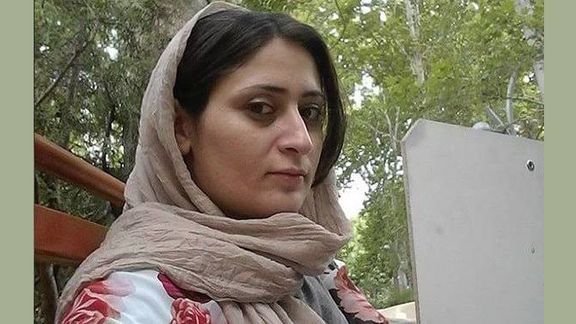
Iranian Women's Rights Activist Atefeh Rangriz was arrested and sent to Semnan Prison, 200 km from Tehran.
According to reports from the Iranian Women's Association's Telegram channel, Rangriz managed to convey this distressing news to her relatives during a brief phone call from prison.
Rangriz's initial arrest took place on May 1, 2019, during a demonstration on International Workers' Day in front of the parliament, where she was protesting alongside a group of fellow activists.
Following her arrest, Rangriz was held in solitary confinement in section 209 of Tehran's Evin prison for several weeks. During the period, she was denied any contact with her family and endured intensive interrogations without legal representation. She was coerced into confessing to allegedly planning protests deemed a threat to national security.
After weeks of interrogation by intelligence officials, Rangriz was brought before the prosecutor's office within Evin prison. She faced a series of charges, including "gathering and colluding against national security," "spreading propaganda against the system," "disrupting public order," and "insulting officers on duty."
While some detainees were eventually released, individuals like Atefeh Rangriz and journalist Marzieh Amiri received prison sentences. Rangriz was initially sentenced to 11 years and six months in prison, along with 74 lashes, in a summary trial. However, her sentence, along with those of other labor activists and protesters from the International Workers' Day demonstration, was later pardoned in the subsequent year.
The exact reasons behind Rangriz's detention remain shrouded in mystery but is one of a number of rearrests of protesters and opposition figures in the lead up to the anniversary of Mahsa Amini's tragic death.

The head of the Mazandaran Provincial Judiciary has announced the closing of 12 schools and educational centers in the northern city of Babol on charges of "promoting Baha'i Faith".
Mohammad Sadegh Akbari further stated that "Baha'i instructors from three cities in the country were providing education and training on their beliefs to promote Baha'ism." As a result, intelligence forces have detained and imprisoned two individuals considered prominent Baha'i instructors in Iran.
Akbari added that in the sealed educational centers in Babol, "a number of books and brochures related to the Baha'i Faith" were confiscated.
The statements by the head of the Mazandaran Judiciary come at a time when, in recent months, there has been a widespread wave of summoning and detaining Baha'i citizens in Iran. The crackdown is happening simultaneously with an escalation of government pressure on various segments of society and political groups following the nationwide protests in 2022.
The Shia clergy consider the Baha'i faith as a heretical sect. In Iran, the Baha'i community, numbering around 300,000, faces systematic persecution, discrimination, and harassment. They are barred from holding public sector jobs and are sometimes dismissed from their private sector employment under pressure from authorities.
During the recent crackdown on Baha'is in Iran, security authorities detained nine Baha'i citizens in Tehran and confiscated 40 Baha'i homes and warehouses belonging to them.
Security authorities in Iran have repeatedly applied pressure on citizens who practice the Baha'i Faith, using various pretexts and security reasons, and have seized or confiscated their properties on multiple occasions.

A former Iranian diplomat says the 2015 nuclear deal is now "a forgotten issue," and "it is not clear whether Iran and the United States will return to that deal."
Jalal Sadatian speaking to Fararu website in Tehran, explained that "nonetheless, from a legal point of view, the contents of the 2015 nuclear deal, also called the Joint Comprehensive Plan of Action (JCPOA), have cast a shadow on Iran's ties with the United States and Europe."
Sadatian further explained that the reason for shifting from the JCPOA to a reported interim agreement is that although Iran stood by its commitment to that deal for a long time, it finally reacted after the Europeans failed to fulfil their obligations after former US President Donald Trump pulled out of the agreement in 2018.
Those reactions included boosting uranium enrichment and using advanced centrifuges that violated the terms of the JCPOA. The Western view, Sadatian said, is that Iran is now very close to the technological stage where it could potentially make a nuclear bomb.
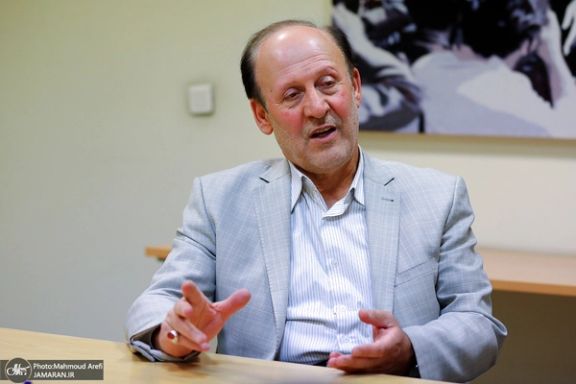
Regarding recent developments, UN’s International Atomic Energy Agency (IAEA) determined that Tehran had effectively reduced its enrichment pace, preventing Iran's nuclear case from being sent to the UN Security Council and opening the door to a potential interim agreement. As part of a prisoner swap deal, the United States agreed to release nearly $9 billion of Iran's funds blocked in Iraq and South Korea because of sanctions.
Sadatian noted that US President Joe Biden is cautious about a deal with Iran due to its potential implications for his position in the US elections. Therefore, it is highly unlikely that the United States will disclose any details about a possible agreement with Iran. He added that if the United States ever releases information about such a deal, it would likely be after the US elections.
Sadatian also mentioned that even if secret talks are ongoing between the two sides, it is challenging to gain early insight into their contents. However, it is known that a prisoner swap and relaxation of sanctions on Iran's oil sales are part of the deal.
The former diplomat also pointed out that Saudi Arabia and other Persian Gulf states welcome a deal between Tehran and Washington as it would reduce tensions in the region, although currently, there are no indications of positive attitudes from Arab states, Russia, or China toward an interim deal.
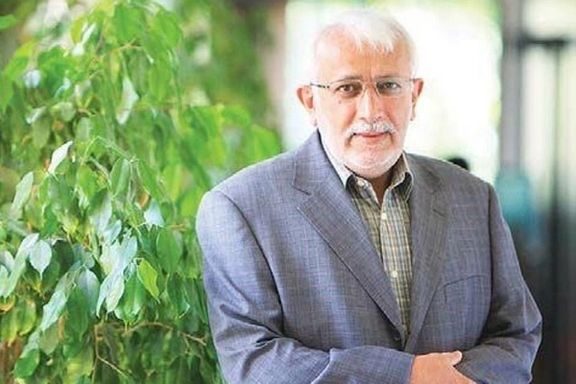
Meanwhile, in another interview with Fararu, former Iranian diplomat Qasem Mohebali said that the Arab states do not have common interests with Russia and China and the Europeans do not want another crisis after the Ukraine war and complications in energy supplies. The Europeans, he said, want Iran's nuclear program to come to a halt.
Mohebali explained the dynamics between Tehran and Washington is a "freeze for freeze deal," while also reminding that the future of Iran-US ties is unpredictable. "If Democrats win the US election and the Ukraine war ends the situation will be absolutely different from a scenario in which the Republicans win the elections, and the Ukraine war continues."
He also noted that Iran's nuclear problem has become a chronic issue, with the JCPOA's eight-year term having ended. Resolution 2231 remains valid until 2025, and Mohebali suggested that sanctions against Iran are unlikely to be fully lifted. However, some sanctions may change, and the United States might grant Iran partial waivers as the situation warrants, as indicated by US Secretary of State Antony Blinken.
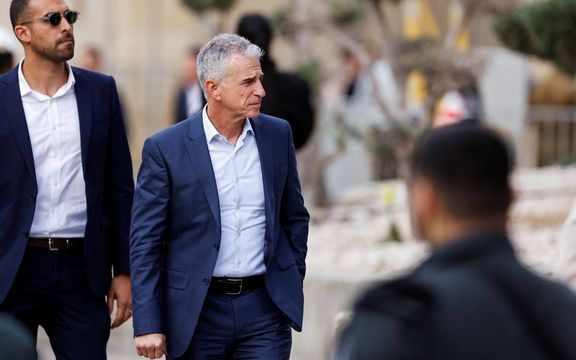
Mossad Director David Barnea says Israel is ready to launch attacks on senior Iranian officials if necessary to defend itself from the regime’s threats.
Speaking at an annual conference of the Institute for Counter-Terrorism Policy (ICT) at Reichman University in Herzliya, Barnea explained that proxies are Iran's way to conceal its terrorist activities. However, he emphasized that the Islamic Republic is practically responsible for everything, including terrorist acts, logistics, funding, and support for militant groups, all directed from the highest levels of leadership.
"The time has come to make Iran pay in a different manner," he declared. Barnea emphasized that any harm to Israelis or Jews, whether through proxies or Iranian weapons smuggled into Israel, would prompt Israel to take action against Iranians, "from ground-level operatives to the highest-ranking officials. I mean that," he emphasized. "These consequences will reach deep into Iran, even into the heart of Tehran," Barnea warned.
The spy agency, along with its allies in the international intelligence community, thwarted 27 attacks against Jews and Israelis abroad over the past year, he revealed. "The captured squads and the weapons seized alongside them all had specific targets," he said. "All of this was under Iran's direction and guidance. We are currently working to track Iranian squads to prevent them from harming Jews and Israelis worldwide."
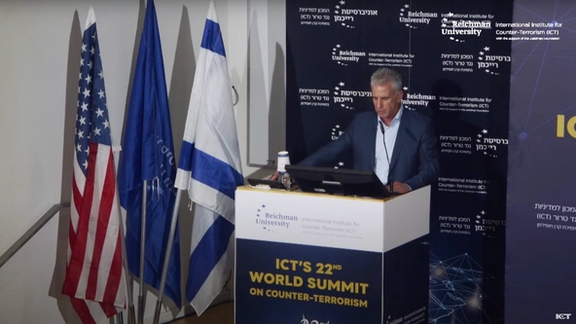
Barnea also noted that these attempts occurred "across the globe, in Europe, Africa, the Far East, and South America." He presented videos showing the capture and interrogation of Iranian terrorist operatives by Mossad agents in Tanzania and Cyprus, two of the countries where such individuals were apprehended. Other countries on this list included Georgia, Greece, and Germany.
The videos used by Barnea in his presentation were also released by Iran International in late March. They featured an officer from Iran's Intelligence Ministry's unit 853, known as Hamidreza Abraheh or Hamid Salari. In the video, which appeared to be an interrogation or confession session, he disclosed the Islamic Republic's efforts to recruit agents from Africa's Baluch minority for terrorist operations in Tanzania.
Another video presented by the Mossad chief during the event showcased confessions from another Iranian agent named Yousef Shahbazi Abbasalilo. An IRGC intelligence operative, he was involved in a hit operation in Cyprus. The video, released in June, revealed Abbasalilo's account of entering Cyprus through the Turkish-occupied north, his surveillance of the initial assassination target, and his preparation and concealment of the weapon.
"All of this is under Iran's direction and guidance. We are currently working to track Iranian squads to prevent them from targeting Jews and Israelis worldwide," he stated.
Barnea also briefed the participants on the structure of Iran's intelligence community, using a chart that featured IRGC Commander-in-Chief Hossein Salami and Intelligence Minister Esmail Khatib at the top.

The Mossad director further claimed that Israel has thwarted multiple deals in which Iranians planned to sell short-range and long-range missiles to Russia, along with the UAVs they previously supplied for Russia's invasion of Ukraine. "I have a sense that more such deals will be intercepted soon. We are concerned that Russia may meet Iran's demands for advanced weapons and raw materials, which could pose a threat to our peace and even our existence here," he added, hinting at the issue of nuclear weapons.
Barnea referred to the expiration of the UN arms embargo on Iran next month under the 2015 nuclear agreement, emphasizing that Iran would take advantage of this opportunity to acquire weapons more affordably. He cautioned that the world needs to recognize the danger posed by a terrorist state aspiring to become a nuclear power.
Iran's Defense Minister Ashtiani claimed earlier this month that all arms embargoes imposed on Iran are set to expire soon, expressing eagerness to expand military ties. European Union ballistic missile sanctions are scheduled to expire on October 18 under the UN resolution endorsing the 2015 nuclear deal. However, European diplomats are considering retaining these sanctions.
He also criticized the US government for its secret agreement with Iran, granting the regime access to billions of dollars that had been frozen due to sanctions, in exchange for the release of five American hostages. Barnea pointed out that Iran is regaining its funds without relinquishing its nuclear progress, highlighting Tehran's failure to respond to IAEA monitroring demands and questions regarding the regime's nuclear violations.
On Saturday, Iran's Intelligence Minister claimed during a TV interview that the fight against Israel is one of the ministry's top priorities. He asserted that the main intelligence services operating against the Islamic Republic are those of England, Israel, and the United States, which also coordinate and direct the activities of other services.
Without specifying a time frame, Khatib added that the intelligence ministry has thwarted 400 bombing operations in the country, with 40 bombs planned to be detonated during religious gatherings in the Islamic holy month of Muharram, which ended in mid-August.






